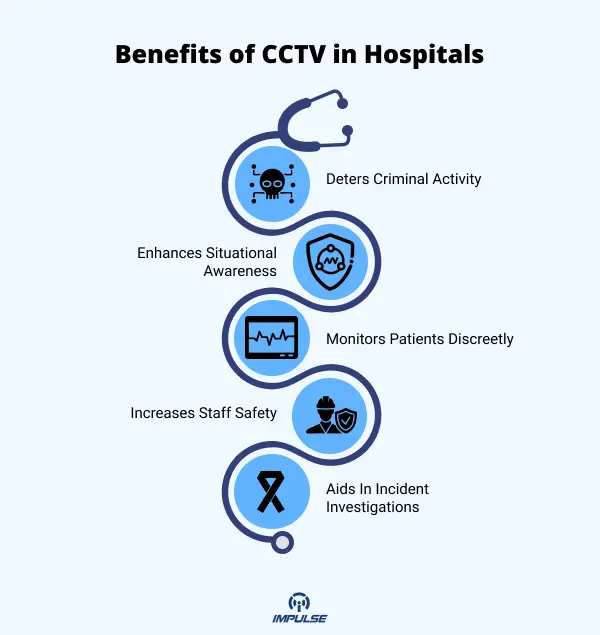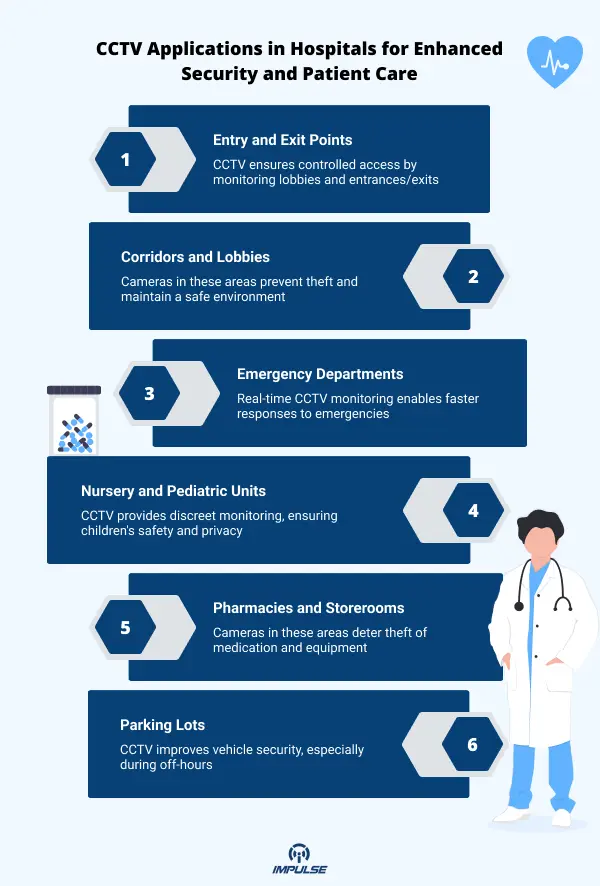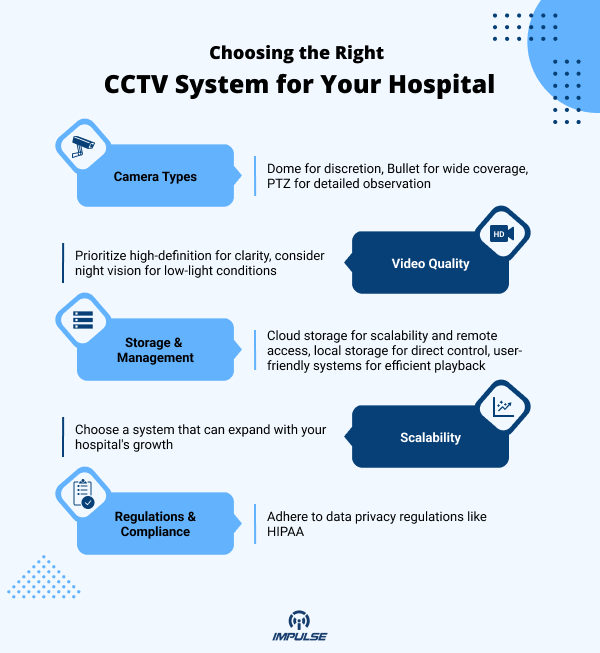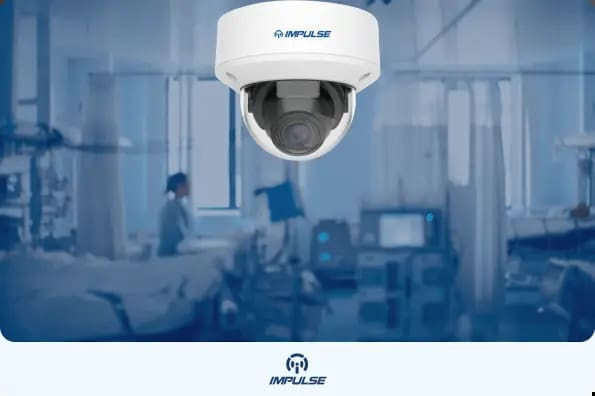Hospitals, renowned as places of healing and recovery, are essential institutions in our society. However, while they are places of comfort and care, they simultaneously face a unique set of security challenges. These challenges range from preventing patient falls to curbing theft of costly medical equipment or personal belongings. Furthermore, they have to deal with issues of workplace violence, which can disrupt the peaceful working environment. Ensuring a safe and secure environment for the staff, patients, and visitors alike is a constant concern that hospital administrators grapple with every single day.
To navigate these complexities, hospital administrators are continuously exploring innovative solutions. One such solution is the adoption of advanced video surveillance technology, also known as Closed-Circuit Television (CCTV). CCTV offers a powerful and effective tool that significantly enhances hospital security while also contributing to the improvement of patient care. This technology serves as the eyes of the administration, keeping a watchful eye on all areas of the hospital to ensure the safety and wellbeing of all within its walls.
The Advantages of Implementing CCTV Systems in Hospital Environments
In today’s world, security has become a significant concern, especially in sensitive environments such as hospitals. One of the most effective ways to enhance security and ensure the safety of patients, staff, and visitors is the strategic placement of CCTV cameras. A well-designed and implemented CCTV system can provide an array of benefits to a hospital setting:

- Deterrence of Criminal Activity: There is a strong psychological aspect to security cameras. The mere visual presence of CCTV cameras serves as a potent deterrent against theft, vandalism, and other forms of criminal activity. Knowing their actions are being recorded, individuals are less likely to engage in illicit activities within the hospital premises.
- Improved Situational Awareness: CCTV systems offer security personnel a broader and more comprehensive view of the hospital’s various areas in real-time. This enhanced perspective significantly improves their situational awareness, enabling them to respond more quickly and effectively to emergencies and other suspicious situations.
- Enhanced Patient Monitoring: Beyond security, CCTV systems can also play a crucial role in patient care. CCTV can be used to discreetly monitor patients in critical care units, nurseries, or those at risk of self-harm. This additional layer of surveillance ensures their continuous well-being and allows medical personnel to respond swiftly if any issues arise.
- Increased Staff Safety: The safety and welfare of hospital staff are of utmost importance. The presence of cameras in hallways, parking lots, and other common areas helps deter potential acts of violence against staff members. By creating a safer work environment, CCTV systems contribute to increased job satisfaction and productivity.
- Incident Investigation and Evidence Collection: In the unfortunate event of an incident occurring within the hospital premises, CCTV footage can prove invaluable. It provides a reliable record of events, offering critical evidence for subsequent investigations and potential legal proceedings. This capability not only aids in achieving justice but also in identifying areas of improvement for the hospital’s security measures.
CCTV Applications for Enhanced Security and Patient Care
Hospitals can strategically deploy CCTV cameras in various areas to maximize security and improve patient care:

- Entry and Exit Points: CCTV cameras at entry and exit points such as lobbies, entrances, and exits help deter unauthorized access and maintain control over who enters the facility. They help identify individuals entering or leaving and can provide a record of all traffic, contributing to overall security.
- Corridors and Lobbies: Cameras in hallways and waiting areas discourage theft of personal belongings and ensure a safe environment for staff and visitors. By providing a constant video surveillance presence, these cameras can prevent potential incidents and aid in identifying persons of interest during a security breach.
- Emergency Departments: Real-time monitoring of the emergency department allows for faster response times to critical situations and improved overall situational awareness. The immediate availability of visual data can aid in effectively managing sudden crises and coordinating swift responses.
- Nursery and Pediatric Units: Discreetly monitor infants and children in these sensitive areas to ensure their safety and well-being without compromising privacy. With the ability to observe without intrusion, caregivers can monitor conditions and respond promptly when necessary, all while maintaining the dignity and privacy of patients.
- Pharmacies and Storerooms: CCTV cameras in these restricted areas deter theft of medication and valuable equipment. They can provide a record of everyone who accesses these areas, ensuring accountability, and discouraging potential theft.
- Parking Lots: Improve security for staff and visitor vehicles by monitoring parking areas, especially during off-hours. Cameras can record any suspicious activity, enhancing vehicle safety, and providing a safer environment for hospital visitors and staff.
Also Read: Cutting-Edge CCTV Technology and Innovations to Watch Out For in 2024
Integration with Other Systems for Enhanced Security
A comprehensive, all-encompassing security approach in hospitals requires the integration of various systems. Closed-Circuit Television (CCTV) systems, in particular, can be effectively combined with other existing hospital systems for enhanced security and efficiency. This integration provides a more holistic view of the hospital’s operations, thereby significantly improving security measures.
- Access Control Systems: One of the ways to enhance security is by linking CCTV footage with access control data. This allows for easy identification of individuals who are entering restricted or sensitive areas within the hospital premises. By doing so, it provides an additional layer of security, ensuring only authorized personnel can access certain areas.
- Electronic Health Records (EHR): Another key benefit of integrating CCTV with other hospital systems is the potential for linking time-stamped video footage with specific patient records. This integration can significantly improve care coordination and provide a more comprehensive incident review process. By having visual evidence connected to a patient’s electronic health record, healthcare professionals can gain more context and understanding of any incident or situation involving the patient.
Also Read: Pros and Cons of Commercial Video Surveillance Systems in 2024
Choosing the Right CCTV System for Your Hospital
When deciding on the best CCTV system for your hospital, it is important to carefully weigh several key factors:

- Types of Cameras: You can choose from a variety of camera types, each serving a unique purpose. Dome cameras, for example, are a good choice for discreet monitoring as they blend well with their surroundings. Bullet cameras, on the other hand, offer wider coverage due to their long and cylindrical shape, making them ideal for monitoring large spaces. PTZ (Pan-Tilt-Zoom) cameras offer the ability to observe specific areas in detail, with the flexibility to adjust the camera’s movements and zoom functions.
- Quality of Video: The clarity of the video your CCTV system produces is crucial. A high-definition resolution will ensure clear identification of individuals and events, which can be pivotal in instances where footage needs to be reviewed. Also, given the necessity of maintaining security 24/7, night vision capabilities are essential for low-light conditions.
- Storage and Management of Footage: How you store and manage your footage is another key consideration. Cloud-based storage offers scalability and easy remote access, making it a suitable option for larger hospitals or those with multiple locations. Local storage, on the other hand, provides more direct control over recorded footage, which can be beneficial for smaller institutions. Regardless of the storage method you choose, it’s important to have a user-friendly management system in place for efficient video retrieval and playback.
- Scalability of the System: As your hospital grows and evolves, so too should your CCTV system. Select a system that allows for easy addition of cameras as the facility expands. This will ensure you are always adequately covered and don’t have to bear the cost of a complete system overhaul in the future.
- Regulations and Compliance: Lastly, it’s vital to ensure your CCTV system adheres to all relevant data privacy regulations. For hospitals in the U.S., this includes compliance with the Health Insurance Portability and Accountability Act (HIPAA), which sets out rules for the safeguarding of medical information.
Conclusion
In conclusion, investing in a robust CCTV system from the top CCTV camera brand in India is of paramount importance for hospitals. It not only bolsters security measures but also significantly contributes to improved patient care. The use of CCTV in hospitals extends beyond merely deterring criminal activity. It also enhances situational awareness, allows for discreet monitoring of patients, and provides invaluable evidence for any necessary investigations. In essence, CCTV serves as a silent guardian, ensuring a secure and safe environment for all – patients, staff, and visitors alike. As we move forward, it’s clear that incorporating CCTV systems into hospital security strategies will continue to play a crucial role in fostering a secure atmosphere where healthcare professionals can focus on their primary goal – delivering exceptional patient care.
Impulse CCTV offers tailored CCTV solutions, addressing your unique security challenges. Impulse CCTV engineers and provides state-of-the-art surveillance systems to integrators, facilitating them to uplift patient care standards.


